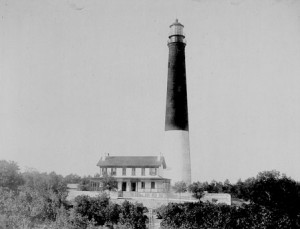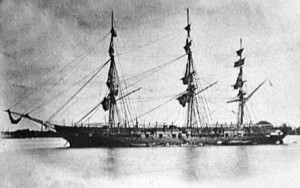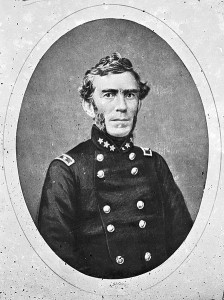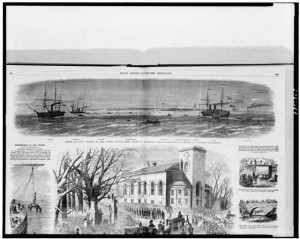From The New-York Times April 2, 1861 (The New York Times Archive):
FROM FORT PICKENS.
The St. Louis Democrat publishes a letter written by an officer in Fort Pickens to a friend in St. Louis. It is dated March 18. After stating that he was ordered into the Fort on Feb. 8, and that he had not received a line since he left home, two months ago, the officer in question says:
“We have hard work, plenty of guard duty, and plenty of anxiety. The Brooklyn, with our men on board, is anchored off the bar about four miles distant.
She is accompanied by the frigate Sabine and sloop-of-war St. Louis. The Government at Washington consented, some time ago, to make an agreement with the authorities on the secession side, to this effect: That if the reinforcements on the Brooklyn were not landed, no preparations for an attack would be made. So we stay as we were. The fleet is hanging on. The sloop-of-war Wyandotte (four guns) is lying in the harbor abreast the fort, and everything is apparently in statu quo.”
We have finished mounting guns and getting in all our wood, and completed those little defences necessary to enable a small command to beat off thousands.
The enemy has mounted, under command of Capt. O’HARA, formerly of the Second Cavalry, some four or five guns at Fort McRea, bearing directly on us. And at the light-house they have two or three heavy Columbiads, nearly enfilading our front face, while at Barancas they have a large number of 32-pounders, and between this and the Navy-yard are two or three batteries. So, you see, we are girt by a wall of fire.
Now and then they change commanders over there, and the work of negotiation has to be done all over again. Col. BRAGG was the last one to get command, and he had to know of us what the status was. Thus, you see, with these frequent changes, (and the companies there change oftener than their commanders,) we have to look sharp; for they do not admit any moral law, nor that one band of rebels is bound by the agreements made by those who preceded them — that is, necessarily bound by them — though in the present case the agreement has been most satisfactorily arranged and agreed to. * * * *
And now, my dear Sir, good bye. Though my affections are with the South, I will do my duty in such a manner that the South will not be ashamed of me. Should the rebels attack us they will fare badly.
I would like to tell you of the “flank defence,” the grape, canister, shells, fire-balls, mortars, columbiads, magazines, mines, scarp and counter scarp, the pickets and guards, the long roll and the alarm, but I cannot now.
God bless you. Let politics alone. There is too much talking now. Yours truly,




